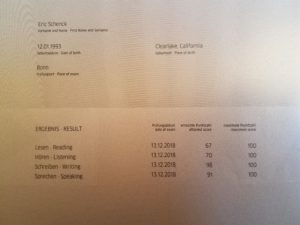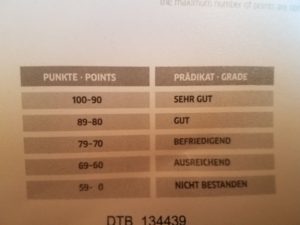Ok, a “clickbait title,” but it’s kinda true.
On July 29th, 2018, I arrived in Germany. I only knew the words danke, auf wiedersehen, and a heavily accented 1-10.
137 days later, on December 13th, I took my B1 Goethe Institute test.
On Christmas Day, I received my results. I had passed every single section, and was officially (entirely through self-study) considered intermediate in German.
My results:
Reading 67/100
Listening: 70/100
Writing: 98/100
Speaking: 91/100
(Passing 60/100)


Sehr gut! 🙂
I say this not to brag (I still feel like an idiot, and my accent is horrible), but to share some advice. Languages can definitely be hacked.
German might be “easier” than Egyptian Arabic, but the principles are the same.
If you start with a good plan and add some consistency over time, you can surprise yourself with your own skills.
Here’s what I did over those 137 days, and how you can apply it to your studies of Egyptian Arabic.
Setting Your Goal
Everybody has heard this one, but it’s true: you have to have a goal. And not just something vague like “speak Arabic,” but something you can measure.
For me the goal was clear: pass the B1 Goethe Institute test.
More than that, though, was the timeline. I knew exactly when the test was happening, and that let me structure my time much more effectively.
“Have a 15 minute conversation with an Egyptian” might be a measurable goal, but it’s not enough. You need to put an end date on it.
People are pretty good at putting things off. Specific goals without timelines are just that: detailed things you want to achieve someday.
If you’re serious about learning Egyptian Arabic, put a little pressure on yourself. It might be uncomfortable, but it’s not supposed to be easy.
Making Your Plan
Once you have a goal and are dedicated to tracking your progress, you have to make a plan.

This can be an ever-changing process, as certain skills might progress faster (or slower) than you originally thought.
Because I am a native speaker of English, I assumed that I would understand a fair amount of spoken German after the first couple of months. A lot of German words (so they say) are quite similar to English. My listening, like it did with Spanish, would take care of itself.
I realized fairly quickly that this wasn’t the case. It seemed that no matter how much I listened, the people around me were still peaking gibberish.
What started out as “focus on vocabulary and grammar and do listening practice every now and then” quickly turned into “listen listen listen listen listen.”
Things change. Learning a language is a bumpy process, and things rarely go according to plan. Be flexible with your priorities.
Here were the most important things I did to learn German at an accelerated rate. Pretty much everything, in one way or another, is applicable to learning Egyptian Arabic.
Watched hours upon hours of Youtube videos
Listening comprehension is hard. You have much less control of other peoples’ word choice and speaking speed, and trying to understand what the hell people are saying can quickly leave you discouraged.
I certainly know that this was the case for me and Egyptian Arabic. I would learn how to say something, write it down in my vocab cards, and then have no idea what an Egyptian was saying when they used the exact same phrase.
My point? Find your weaknesses with Egyptian Arabic as quickly as you can, and then try as hard as you can to improve them.
Made a stack of vocabulary sheets, and transferred tricky phrases to Anki app
I made sure to write in full phrases or sentences, and not just solitary words. This should always be your strategy, as your brain will remember something much better when given context.
Anything that I consistently had trouble with was then transferred to the Anki app. This app uses spaced repetition, which means that the longer you take to remember a phrase, the more frequently you will see it.
Do this with new Egyptian phrases and words whenever you can.
Skype conversations at least twice a week
This got my confidence up. It also taught me a ton of useful vocabulary, as I was talking to native German speakers. The more we got to know each other, the more comfortable we got, and the more various our topics became.
I found these free conversation partners through iTalki (best website in the world for language learning) and the Tandem app. I also paid an iTalki tutor for eight lessons the week before my test. This ended up being the bulk of my budget.
This mimicked my strategy for learning Egyptian Arabic. Find conversation partners who are willing to chat with you once a week (or more) and then get busy speaking.
Socializing
Using German in real life was the best thing I did the last four months.

Whether it was practicing with my girlfriend, language exchanges in person, or meeting up with people at Couchsurfing events, socializing was the way to go.
These were always real situations with a real language, which provided much more benefits than just studying vocab in my room. Even better, though, was the hit of inspiration they gave me. I would always come away with a renewed focus on WHY I was studying German in the first place: connecting with Germans (who are pretty cool :D).
Same thing with Egyptian Arabic. A social life in your target language can only be a good thing.
The internet is your friend here, as it’s never been easier to find friends based on a specific language.
Tracking Your Progress
To pass a B1 German test, Google told me that you need between 350 and 400 hours of study time. This would vary depending on a variety of factors (your native tongue, previous experience learning languages, your everyday exposure to native speakers), but 350 was a minimum.
I ended at 300 hours on the dot. This averaged out to two hours, 12 minutes per day.
My 300 hours was stretching it a bit, and indeed, I barely passed the reading and listening. I’m sure my scores would have also been in the 90’s with another 50-100 hours.
Regardless, the only reason that I knew I was at 300 hours was because I tracked my study time religiously.
And, if you want to learn Egyptian Arabic, you should too.
I see so many language learners set a specific and time-bound goal (a great start) only to go about their studies in a very haphazard way. That’s totally fine IF you want to take things a bit more slowly.
However, things are very different with a “time bound” goal. If you want to pass a test in a few months, for example, you have to be a stickler with logging your time. It does you no good to “write your study time when you feel like it,” or to simply estimate things.
If you studied vocabulary for 17 minutes, then you shouldn’t be writing 15 or 20 (again, if you want to learn a language as fast as possible).

Granted, some language goals have much more “set in stone” time required than others.
Egyptian Arabic is less “popular” as a foreign language than German, so the estimates for time required (especially for goals that are not so specific as “Pass B1 test”) vary widely.
Still, tracking your time can only do you good. You will have no idea of the pace at which you are progressing if you have no idea how much time you are spending.
A detailed sheet of the hours you spend studying is always a good idea. If you don’t already have a daily journal to track your study time, go get one. A pen and notebook, labeled by date, should do just fine.
Two hours/day isn’t sustainable for most people, but everybody has at least a little free time.
Find chunks throughout your day, and use them wisely.
Breakdown of Time and Money
Total time spent: 300 hours
Listening: 160 hours
Speaking: 65 hours
Vocabulary: 50 hours
Reading: 20 hours (This is a great example of how surprising the language learning process can be. I scored great on every B1 practice reading test that I took, and it ended up being my worst grade on the test).
Writing: 5 hours (Keep in mind, I was still writing a TON of vocabulary note cards. This definitely counts. But let’s be honest, the writing section of the Goethe Institute test is also the easiest part by far.)
Adapt this to fit your own goals. If you only want speak with Egyptians, focus your efforts on listening and speaking.
Cleo Lingo will soon be releasing a comprehensive list of Egyptian Arabic resources at your disposal, so stay tuned.
Total money spent: 127 euros
iTalki tutor for one week: 80 euros
German pod 101 3-month subscription: 30 euros
Grammar book: 15 euros
Notebook and pens: 2 euros
 There are so many free resources out there for just about everything you want to learn. You just have to go looking.
There are so many free resources out there for just about everything you want to learn. You just have to go looking.
My “total money spent” makes me particularly proud. Look around for German lessons, and you are quickly looking at hundreds (or even thousands) of dollars down the drain. I spent maybe 10 percent of what your average learner will for classes, online courses, etc.
This is one area where Egyptian Arabic learners can consider themselves lucky. Most private teachers, whether online or in-person, will be cheaper than European languages, especially if you are already living in Egypt.
…..
All in all, I passed each part of the B1 Goethe Institute test faster than pretty much anybody expected. Myself included.
Lots of people told me that I would probably need at least a year, but could absolutely best case scenario hope to do it in eight months.
I did it in four.
Like I said, languages can be hacked. The trick to learning Egyptian Arabic (or anything) is to stay consistent with a decent plan.
I was consistent with a decent plan, and it paid off.
Conclusion
The main takeaway here is that languages can be self-learned both effectively and inexpensively, regardless of what the language is.
Set a good goal, make an actionable plan, and track your progress like a crazy person.
I learned German to an intermediate level quite fast.
If you use the same techniques, you can do the same with Egyptian Arabic.
You don’t have to be a language guru or be exceptionally talented.
Just put in the time, stay consistent, and rapid language-learning is yours for the taking.

